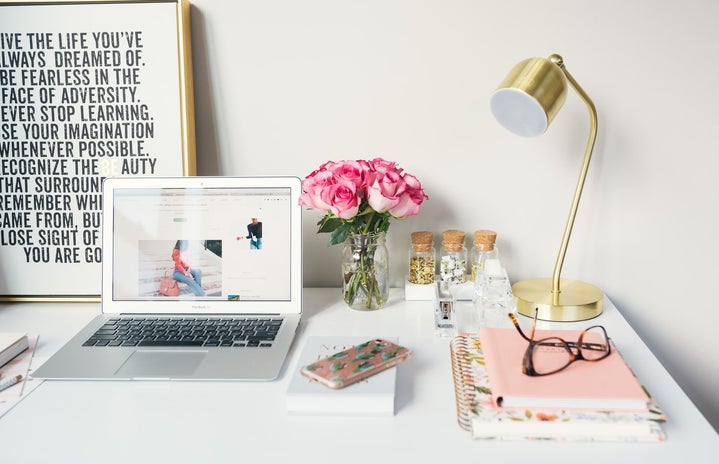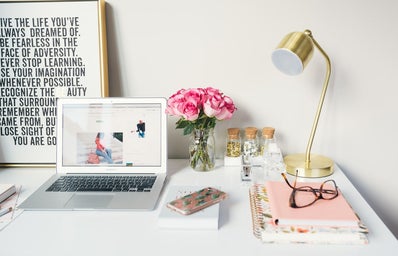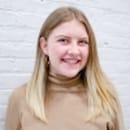For Gen-Z and Millennial women, balancing several side hustles is the name of the game in the writing world. Amanda Montell knows exactly how to handle this balancing act — whether it’s serving as the staff features editor for Who What Wear, writing investigative pop culture on Cosmopolitan, Marie Claire, Byrdie and more, or working on a web series that ultimately lead to her book deal, Amanda can hustle.
With a degree from NYU in linguistics and a passion for creating educational content through an entertaining lens, Amanda published her first book, “Wordslut: A Feminist Guide to Taking Back The English Language”, an absolute must-read if you’re intrigued with the way we use language and the power dynamics that are created within it. From deep dives into the depths of gendered insults, to why phrases like “you guys” sticks around while other gender-neutral phrases don’t, “Wordslut” is a comprehensive, palatable and hilarious look into Amanda’s insight on the English language.
We chatted with Amanda on how she did it — managing a hefty writing workload, working in corporate settings when you’re a not-so-corporate kind of person, and actually getting your foot in the door in the editorial and book industry.
Her Campus (HC): How did you get interested in writing and reporting in general? Was it something you kind of knew before going into college or was there an experience in college at NYU that helped define and help you move forward to discover that you were interested in this?
Amanda Montell (AM): I actually did not know that I wanted to write professionally before college, it was really in my freshman year introductory creative writing workshop that I realized, like, “oh this is the creative discipline that I want to pursue professionally.” I was doing a lot of internships, just to sort of try on different careers in the literary field. I started off doing an internship for a little startup magazine — it was a literary nonprofit and that didn’t really seem to fit. Once I started interning in digital media, I realized that it was a fun way to spend my days while I was hustling at night to become an author, because writing nonfiction was my ultimate dream. I took this nonfiction masterclass at NYU during my senior year, and that’s when I realized, “okay, I want to publish a nonfiction book” at the time where I thought I wanted to publish personal essays. But that’s not a job until it is somehow.
So I figured, during the day, I’d pursue a magazine writing job. I knew I was going to be moving to LA since my boyfriend at the time lived there and I was a little nervous because the magazine publishing world is very much New-York-based. I worked a lot of pretty “janky” jobs when I was in LA. I just took whatever gig I could, and then on the side, was really trying to get myself in the literary community of LA. It’s really quite small, but they were really supportive and friendly. I would go to a ton of literary events by myself because I had no friends at that point. I also had a volunteer position for a literary magazine — I was just trying to keep as many irons in the fire as I could. Whenever anyone offered me an opportunity to write for them, even if I had never heard of them, I took it.

I ended up working at Byrdie, the online beauty magazine, and at Who What Wear, which is fashion. In the meantime, my side hustle was making a web series called ‘The Dirty Word’ that I would film in my apartment on this 10-year-old camera. It was the content of that web series — which was about language, gender, and pop culture — that ultimately was proof of concept or the inspiration behind the book deal. Once I got on the phone with the literary agent, she thought that [the web series concept] would make the most sellable book. I totally agreed and was thrilled that she thought so too, because I was a linguistics major in college, and I loved it more than anything.
HC: It sounds like you just had a huge balancing act between wanting to write a book and working in media, so that’s really interesting. I feel like that resonates with a lot of women in college that have a passion for writing and have to perform that tricky balancing act.
It’s that classic millennial/Gen Z hustle — have a million things going on and just hope that one of the things is going to lead to something. What I think is so lucky [about my situation] is that all of the things that I had been doing added up to the creation of “Wordslut”. The book involved reporting, which I started to do more of during my day job on lighter topics like beauty and fashion, and pop culture. I also started writing for publications like Marie Claire, where I got to do slightly more in-depth, investigative culture pieces. That was really important because this is, at the end of the day, a reported nonfiction book. The creative writing stuff I did on the side was really helpful because if you’re going to write a book, you want to have a little bit of creative writing training just so that you have a voice. It’s that constant hustle — I wanted my creative passion to lead to a career somehow, but I asked myself, “how do I do that?”. I had to come at it from so many different angles.
HC: What kind of challenges did you face within the industry or during the process of writing your own book? How did you navigate these challenges?
AM: I had no connections with the media or literary worlds. My parents are research scientists studying at a university so I just had to weasel my way in. When I moved to LA, I felt extremely lonely, extremely poor, I had no job, no prospects, no anything. It’s hard when you’re in your early 20s and you have your dreams that you want to do on the side, but at the same time, you’re in a corporate office. I’ve had so many bosses and mentors try to reel in my personality to make me more corporate. I’ve been told on many occasions to have more poise or to not talk so much. But these are the qualities that helped me when I was outside of these corporate media jobs. They helped me get to know the people that would actually be the most important in helping me in my literary and creative career.

I’ve had multiple female bosses who achieved success in this male-dominated, corporate world. They turned to me and thought, “she has too much chutzpah, she’s too casual, she’ll never survive in a corporate environment.” And that’s totally true, I did not survive in a corporate environment, but that was never my goal, either. I had to tell myself, “just tell this person what they want to hear, but don’t change.” I knew that the fact that I had a foul mouth and I said what I meant was a part of who I am. I just knew I didn’t want to kill that. Fast-forward 4 years, I have this book called “Wordslut” that my corporate bosses would never approve. Having no connections, no money, and trying your best to use your personality to make connections — and to have those personality skills shot down during the day — was tricky.
HC: What did you want to accomplish with “Wordslut”? Did you have a vision in mind from the beginning or did it grow and evolve as you began writing it? What were your goals and your aim for an accomplishment there?
AM: The main vision for the book was very much inspired by the web series which I was doing. The goal was to write about a super niche, understudied field of academic (sociolinguistics) to make it sparkling and audible and empowering. I was really inspired by the topic of language and gender, where you’re really exposing hidden sexism in language and empowering people with empirical evidence of what certain qualities of their speech really are. Empowering people with that information and making it palpable and real for the people was my main goal. I don’t have a PhD [in this topic], but I have a passion for it and a foundational knowledge for it. I just wanted to take the cheeky, internet-y voice that I have when I write my other work and apply it to this sometimes stuffy-seeming field of study.
HC: What advice would you give to a twenty-something who is interested in this industry? Anything you wish you knew before really diving into it?
AM: One piece of advice that’s just very practical is to join one of these secret writers group on Facebook that’s called “Binders” — that was huge for me. There are all of these secret groups of women and non-conforming writers on Facebook called “Binders Full of ‘Insert Type of Writer Here'”. You have to be invited, which is the tricky part. If someone wants to be invited to a Binders group, just DM me or friend me on Facebook. These Binders are really, really amazing networks where you have Google Docs full of editor contacts and people that you can pitch stories to. You have thousands of people to give you advice.
I know it worked for me, but there’s no secret sauce and things work differently for everyone. Just pitch, pitch, pitch, pitch everywhere. Don’t worry about annoying people. Show up at events and just get your name and face out there. Even if what you’re submitting is not perfect, people who matter will be endeared to you, and eventually, someone will give you a chance. The first step, and the easiest step, is just to get into one of these secret Facebook groups.
Be sure to make “Wordslut: A Feminist Guide to Taking Back The English Language” your beach read this summer.


